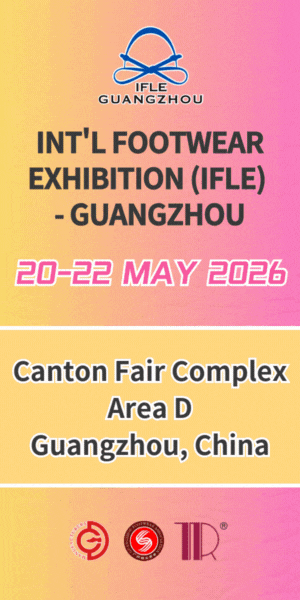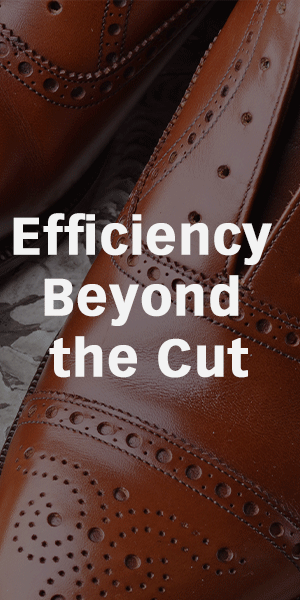Eco-conscious fabrics

Nowadays, it is hard to believe that 40 years ago, shoe linings were very much of a secondary item with regard to shoe uppers. They were after all, hidden inside the shoe and, at that time, foot comfort and health were not always priority considerations.
All this began to change when William Fay Snr. launched Faytex Corp. in 1978. Within two years, he brought his first innovative product to North America's footwear market in the form of Cambrelle*. This heat bonded by component nylon fabric was revolutionary as its exceptional breathability offered a high degree of comfort to the foot. Things are now very different.
In 1988, he introduced Dri-Lex, closely followed by the patented Dri-Lex Aerospacer in 1989. These were among the first synthetic moisture management linings on the footwear market that used specialised yarns to move moisture away from the foot. He was also one of the first suppliers in the industry to brand his products to his customers having foreseen how important branding would become to the consumer in the future. Today, Dri-Lex fabrics in the form of linings, uppers and packages are used by top footwear brands around the world under its trademark brand names of Dri-Lex, Dri-lex Eco, Dri-Brelle, Dri-Freeze, Dri-Blaze, Dri-Lex Aerospacer and Dri-Lex Weatherpruf.
In 2007, the company introduced its first environmentally friendly fabrics under the Dri-Lex Eco Collection banner. By adding recycled nylons and polyesters to Dri-Lex fabrics over time, as well as a new line of sustainable fabrics featuring DuPont Sorona in 2010, Faytex now claims to have the most complete line of verifiable, eco-friendly fabrics in the footwear industry. Faytex head of Sales and Marketing Katie Stangl says that, “We have always prided ourselves on our quality so we develop and/or partner up with companies to bring these quality and technical products to the market. We have evolved our products (while staying true to our roots of quality and comfort) as the industry has changed. The major technologies we work with today are in the category of the sustainable markets.”
Working with partners
15 years ago the company teamed up with Unifi to begin offering their third party certifiable and traceable recycled Repreve yarns in its products after having had a longstanding relationship with them on other yarns they offer. “We knew this was a direction the industry would eventually have to go in and so we wanted to team up with a company like Unifi that is trusted for the transparency on the products they offer. A lot of brand customers we had at the time realised the importance and started adding these sustainable stories to their apparel and other products which is usually first to happen and footwear will follow along with these marketing stories.”
Faytex says that the Repreve recycled fibres in Dri-Lex Eco fabrics offer distinct advantages that are easy for footwear producers and their customers to understand. They are initially certified as recycled and can be verified at any point in the lifecycle of a product through independent third-party testing. Each pound of Repreve polyester fibres saves the energy equivalent of 0.4 gallons of petrol with fewer chemical by-products created during the recycling process compared to virgin polyester. Their characteristics in a finished fabric are close to those of it in critical areas such as durability, hand, abrasion resistance, etc. Further more, the price gap between the two is closing rapidly.
Initial reluctance
Whilst it would appear that some brands stand behind the sustainability stories and have been utilising products the company offers in those categories for some time now, others have not been as quick to pick it up, mostly due to the cost involved. More recently, however, there has been a major shift with brand customers asking to switch a core product they are putting in their shoes to an eco-friendly version as they now realise that it does not add much more to the cost of a pair of shoes and has increasingly become a positive selling feature for consumers. Although this latter factor is now becoming ever more important, introducing a ‘green’ material source has sometimes proved difficult. Take Dri-Lex Eco and its use of Sorona, for instance. This is a polymer made from the fermentation of plant sugars. All Sorona fabrics are certified to look good, feel good, and do good through the Common Thread Fabric Certification Program thus ensuring the performance customers deserve and the accountability our industry needs.
“What we discovered at forward-thinking smaller brands were people who wanted to make a difference and an environmental statement. First, they realised they weren’t sacrificing anything since these Dri-Lex constructions performed as well as or better than most other polyester- or nylon-based fabrics in abrasion resistance and durability tests. The soft hand also gave them a product advantage at retail as soon as the customer picked up the shoe and felt the fabric. Finally, they had the ability to use Sorona’s sustainability feature to tell a ‘green’ story if they so chose,” says Ms Stangl.
In fact, it quickly became apparent that the value of the new fibre was not just that it was environmentally friendly, but that it also had the potential to perform to a high standard in everything from athletic footwear to fashionable urban chukka boots. Sorona is said to have a full, soft hand and higher elasticity than common polyester and to its fibres to contain 37% non-petroleum derived chemicals obtained through the fermentation of renewable and sustainable plant sugars. It can also be dyed at lower temperatures, saving energy.
Other technologies
Dri-lex Eco with Cleansport NXT* offers a process that uses pro-biotic technology to provide a method of odour control within athletic footwear. Beneficial microbes, which are found all around us and are naturally occurring, are selected and bonded to the surface of the fabric. This innovative process of applying live micro-organisms to fibres results in natural, non-toxic health benefits to both consumers and the environment.
Dri-lex Eco products also employ other eco friendly techniques in their manufacture such as saturated dyeing. In this instance, a rapidly moving conveyor system rotates materials through the dyeing process at a constant speed and sprays them with water rather than submerging them in a water bath. This energy efficient process uses less water than traditional dyeing while maintaining uniform colours.
Dope dyeing is another environmentally friendly and efficient innovation in the dyeing process. In traditional piece dyeing the fabric is knitted or woven first then dyed as a whole whereas with dope dyeing the yarn itself is dyed. This process also increases the colourfastness of the knitted product. Other products in the Dri-lex Eco range can contain materials such as recycled coffee grounds, wool, undyed cotton and linens, biodegradable fibre, fibre from waste pineapple leaves, recycled foams as well as Made in USA Berry Compliant recycled stories.
As to the future, Katie Stangl sees Faytex as a global company where investment in these areas of sustainability and other environmental technologies will continue to be of great importance. For instance, any standard product being ordered will be a recycled polyester and/or other sustainable fibre using water saving practices for dyeing rather than this having to be specified by the brand customer. “We hope that in the next few years we will be able to make this transition the norm and offer it to all. We see our industry trending in this direction, hope it continues and are proud that we can be even a small part of this initiative. Social media, politics and other technologies will drive this progression at a faster pace than before and we will be constantly evolving to keep up. We hope to see manufacturing close to home continue to grow so we can still contribute our domestic business and investment to Made in USA stories.”
*Cambrelle® is a registered trademark of Camtex Ltd.
Cleansport NXT™ is a registered trademark of Evoco Ltd.
Dope dyeing is one of the environmentally friendly techniques employed by Faytex.
IMAGE CREDIT: SHUTTERSTOCK / OLEG KLYUCHINSKIY












